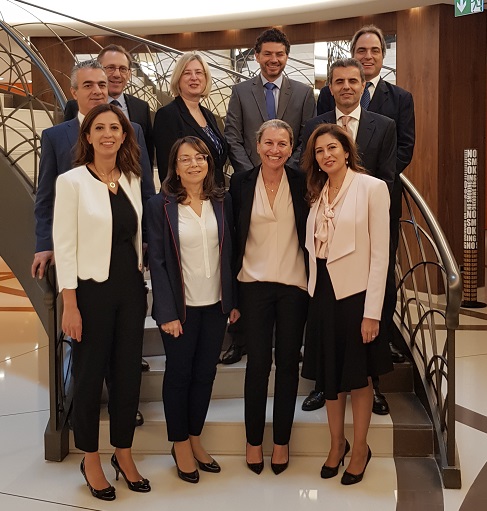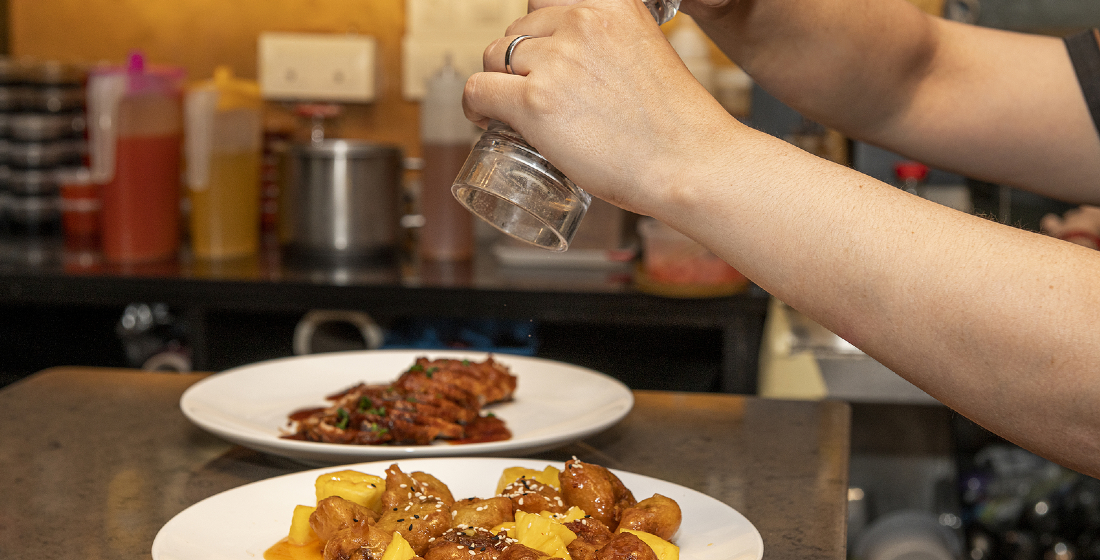Lebanon takes advantage of deep roots in trade
Like its national symbol, the cedar tree, Lebanon has deep roots as a regional trade hub. With the right support, the country is poised to benefit from its unique position. In this discussion in Beirut, hosted by BNY Mellon, TXF finds the banks are showing best practice in adopting global regulation and asks how they are adapting to rapid change in the face of global protectionism and trade digitisation.


Participants
Layla Tohmé, Head of Group Financial Institutions Department, Byblos Bank
Georges Andraos, Head of International Banking Division, Fransabank
Moussa Abdallah, Head of Correspondent Banking Department, Bank of Beirut
Mona Mroue, Head of Global Transaction Banking, SGBL
Ziad Ghosn, Head of Group FI and Transaction Banking, Bankmed
Maurice Iskandar, Assistant General Manager, Head of International Division, Banque Libano Francaise
Rana Beydoun, Head of Financial Institutions Department, BLOM Bank
Philippe Arbadji, Vice President, Relationship Manager Lebanon & GCC, BNY Mellon
Katharine Morton, Head of Trade, Treasury & Risk, TXF [moderator]
TXF: What is the current state of trade and trade finance in the Lebanon and are the current fiscal reforms having an impact on banks and the solutions that they are able to provide in trade?
Ziad Ghosn: Trade in Lebanon is predominantly composed of imports, although we do also have a few exports – mainly refined jewellery. Despite the growth in population due to the refugee crisis after 2011, imports have been quite stable from 2014 to 2018, ranging between $18.6 billion and $21.4 billion. The bulk of the refugee influx was registered before 2014 and the slight increase in the numbers after 2014 didn’t have a big impact on import activity which remained stable during this period.
I was expecting an increase in imports as a result of this slight growth in population, but this has not happened. Total 2017 oil imports were around $4.2 billion and non-oil around $15.4 billion, giving a total of around $20 billion.
When it comes to trade partners of Lebanon, they haven't changed significantly over the past years. Some new names have joined the traditional trading partners mainly due to increasing imports from China. However, as a frontier market, Lebanon still has significant room for growth in terms of imports from China, compared to what other countries in the region import from China.
There is a lot of room for improvement in terms of trading with China. More needs to be done on economic/business/trade ties between the two countries, both on the official and the private sector sides and from local and global banks.
Finally, when it comes to trade instruments used by Lebanon as a country for imports – as they constitute most of our trade activity and as exports are [mostly] limited to niche sectors such as refined jewellery – we haven't seen a great shift from letters of credit into documentary collections or vice versa, or a big shift into open account. Import activity is still predominantly between documentary collections and letters of credit.
These are the two major instruments used. As for open account trades, they are usually done with very well established Lebanese traders with a long standing relationship and track record with their suppliers overseas. It is [worth mentioning] that a good share of imports from China are done through import LCs that are not confirmed. This is good for both importers and end users as it reduces the cost. Such practice should be encouraged.
Rana Beydoun: In addition to balance sheet instruments, we saw demand from our clients for borrowing specifically for trade finance transactions to bridge the cashflow for inventory sales. This was also the direction that most Lebanese banks took to discourage the use of overdraft facilities and encourage specific trade finance transactions.
Mona Mroue: I agree with Ziad that trade in Lebanon is mainly imports. In fact, the economy is predominantly based on private consumption averaging 88% of GDP with goods in demand not supplied internally and hence the large external deficit position. Although the volume of imports didn't change over the years, exports have decreased dramatically from $4.5 billion in 2011 to $3 billion lately. This is mainly because the borders separating Lebanon from the GCC and the Arab countries have been closed since 2015 due to the Syrian war, prohibiting exports. However, in October 2018 the Nassib border between Syria and Jordan, which is a vital waypoint for Lebanese trade to the region, was reopened. So we hope this will help exports to pick up again.
TXF: What does that export profile to GCC look like, is it mostly jewellery?
Mona Mroue: The country is well known for its agricultural produce, particularly citrus, grapes, tomatoes, apples, vegetables, potatoes and olives. Vegetables and fruit products exports account for 19.6%, prepared foodstuffs 15.5%, chemicals 15% and base metals 25.8%. Lebanon’s primary export partners are Turkey at 21.3%, Syria 15.9%, Kingdom of Saudi Arabia 6.1%, Egypt 5.1%, Kuwait 4.7%, UAE 4.4% and Iraq 3.9%.
Ziad Ghosn: A big portion of Lebanese exports is in the form of refined jewellery as we have well-known brands and designers in Lebanon. In 2017, gold was 17% of total exports and diamonds consisted of 3%.
Layla Tohmé: And machinery such as electrical generators [3%].
Ziad Ghosn: On the import side, the only increase was in oil, maybe not in dollar terms because if you compare 2014 average crude oil price versus the 2016 average, it dropped from $96 to $42/barrel, so by 50%. However, oil imports in dollar terms did not drop proportionally but only went down from $5.7 billion to $4.1 billion. That is explained by larger oil consumption due to the increase in population.
TXF: Tell us more about the fiscal reforms and how they will impact trade finance?
Rana Beydoun: There were some fiscal 'adjustments' in Lebanon. We cannot call them reforms because they were public finances neutral, as the increases in taxes were more or less compensated for by a rise in spending. For instance, VAT increased by one percentage point to 11%, the tax on interest increased from 5% to 7%. There was a tax on FI corporate profits and on fixed income instruments.
The idea was that those increases were used to subsidise an increase in public sector wages so they were more or less public finances neutral. The result was clear inflationary pressure in the market though.
Now when we talk about fiscal reforms, we envisage future reforms and those pledged under the CEDRE conference [which took place in Paris in April 2018 and at which the government presented a Capital Investment Plan (CIP)]. Those would definitely have a much more positive impact on the economy because they are also coupled with significant spending on infrastructure. This will definitely have a positive impact on trade finance.
Hopefully the seriousness that was shown at CEDRE will be substantiated. The Prime Minister pledged at the time to reduce the public finance deficit by five percentage points over five years. This is really massive and the funds that were pledged during the CEDRE conference were around $11 billion. For an economy the size of Lebanon, with GDP at around $53 billion, this is really substantial. There is a lot of involvement by international financial institutions such as the EBRD and the World Bank, which is one of the most important donors and supporters of Lebanon. The overall picture would change with such important investments made in the infrastructure and would definitely spur more growth in the trade finance sector.
TXF: When do you think the CEDRE pledges will actually come to fruition?
Rana Beydoun: We need a government to be formed first. One of our main international correspondents held an event here in Lebanon recently and their chief economist mentioned something that we have observed in the past: once there is political consensus in Lebanon, things move, and they move very quickly. Therefore, we are very optimistic about the prospects of CEDRE.
Mona Mroue: I agree that once things are set in motion in the right direction, the rate of progress is fast. A case in point is that in 2006 Lebanon’s public debt, which is one of the key indicators that economists are currently alarmed about, peaked at 180% of GDP but then exceptional growth in GDP over four years, led by construction, infrastructure and capital expenditure reversed the trend and pushed the debt to GDP down by 40%.
We are hoping that, similarly, the pledges by the international community promised at the CEDRE conference will be a positive catalyst spurring GDP growth and eventually reducing debt.
TXF: Any pessimism?
Ziad Ghosn: Actually the opposite. You don't need the full proceeds of the CEDRE conference to be deployed in order to stimulate growth in the country. Let's say one-third of that is sufficient to start seeing the positive impact on the denominator of the fraction of debt to GDP.
Mona Mroue: Not to mention the positive signs that this would send to international investors, boosting confidence and capital inflows and helping the economy.
Ziad Ghosn: Obviously Lebanon is operating below its potential GDP. Yes we have a GDP of $50 billion, but we are a country that should target a GDP of $100 billion, which is achievable. The role of the private sector would be key in that respect, in addition of course to the public sector in the form of government reforms and incentives.
Georges Andraos: Just to come back to the trade angle. Historically, our partners remain the same in terms of countries so the US, Europe, China, Italy and Europe, so not much has changed. But we should not forget that Lebanon is a trading platform that also serves triangular transactions, not only to Lebanon but also to Africa and others, which should be considered on the import numbers.
TXF: So Lebanon acts as an entrepot and facilitator for elsewhere?
Georges Andraos: Looking to the future, with CIP and looking at the reconstruction of Syria, we don't know yet, but, similar to other countries in the region, we have started to prepare ourselves to be a hub for companies interested or willing to be part of the reconstruction of Syria. So that's why some of this CIP project that we've put in the pipeline and approved, particularly in the northern part of Lebanon – such as upgrading the port, having an airport, a free trade zone, is designed to prepare Lebanon not to miss the chance again to be involved heavily in the reconstruction of Syria, as well as Iraq.
Ziad Ghosn: And as was mentioned, before the crisis in Syria we used to play this role because we have the proximity of our ports to Europe for the Levant and the GCC. We serve naturally as a conduit and transit to the rest of the Arab world and the road transportation remains the most economic one.
Mona Mroue: Adding to that, a solid and sound banking and financial system that is capable of supporting trade and investment.
TXF: What about trade finance instruments themselves?
Ziad Ghosn: One thing that I have been witnessing throughout the past 20 years, and it’s not specifically related to Lebanon, is that importers/suppliers have become more involved in structuring the transactions and agreeing on the terms and the choice of trade finance instruments prior to approaching the banks.
Today, transactions reach the bank after having been agreed between the supplier and the importer. In a good number of transactions, the correspondent bank is pre-nominated as well.
Also, there is virtually no more trade finance without [the use of the] balance sheet, which could come in the form of LC post-financing or UPAS (Usance Payable at Sight LCs).
TXF: With the Basel III/IV reforms leading to derisking correspondent banking relationships as banks need to allocate capital behind trade, is that something that's still impacting banks in Lebanon, or are you in a pretty strong position?
Maurice Iskandar: I was going to dampen the mood to talk about fiscal reforms and adjustments to the balance of payments, but I'll just leave the positive vibe on that side of the table.
First of all I still contest the wording of 'derisking'. It's more evident now as banks and correspondents are not hiding behind 'derisking' anymore and are clearly mentioning that they are either demarketing or deleveraging or exiting certain markets. They are clearly talking about P&L issues when onboarding or working with other banks.
So if we leave that discussion on the side and just look at the progress we've had over the past few years on derisking, it's safe to say that in view of Lebanese banks' proactive approach with their correspondents, we have been successful in managing this global derisking wave that has been sweeping a lot of the regions and not just the Middle East. It's certainly not finished. A lot of correspondent banks are reviewing the whole principle of correspondent banking and profitability issues and we'll continue to witness some exiting here and there.
But we're also witnessing a lot of re-onboarding. A lot of banks understand that correspondent banking is still one of the main fundamental businesses. And it's probably a less risky business than some of the other things that they're doing. So when you balance this profitability issue to the credit risk that you're taking it makes sense to maintain. Lebanese banks should continue to be proactive in this. The Association of Banks in Lebanon (ABL) should probably become a bit more efficient in spearheading the efforts.
Mona Mroue: Lebanese banks have been proactive with their correspondents early on, engaging in discussions on compliance and AML (Anti Money Laundering) and making sure they are compliant with all international regulations and best practices. This is being supported and encouraged by the Central Bank of Lebanon through various directives and circulars which puts us now in a strong position compared to other countries. So derisking whereby financial institutions are terminating or restricting relationships with the objective of mitigating compliance and regulatory risks is not an issue that we are facing as a banking community in Lebanon.
Maurice Iskandar: And some of the other banking sectors have tried to emulate the efforts that were done by Lebanese banks more or less successfully. But we've set an example on how a banking sector should behave, should show more transparency, should be proactive in putting in place the necessary procedures and processes besides the regulations.
We don't have any issue with the regulatory aspects and we really go out and talk to the correspondents and engage with them in a transparent way.
Georges Andraos: It's been a learning process. We've had some issues in the sector but banks have learned. The communication channels between the banks and their correspondents are open and we are sharing best practices. The fact that banks went and sat down with their correspondents and with the regulators has helped build a clearer picture and really give a deep understanding of the markets.
Maurice Iskandar: It's been a source of ongoing discussions across all of the banks, within these banks and all the correspondents. Of course, we keep learning and we keep taking cues from various correspondents. Each correspondent has their own interpretation of some of the rules and regulations. It's good to be able to manage this and get to a common framework of understanding and take the necessary measures.
Phillipe Arbadji: It's very important to be proactive because when you are proactive you take your own decisions and you can limit the damage. Whereas if someone from outside comes in and says 'you have to do it' or 'you don't have to do it' then you will have to take radical measures which you do not want.
Layla Tohmé: I agree with what Maurice said, but I would add we have witnessed some small derisking this year and there may be some more next year in normal – not exotic – currencies. But this has been viewed by all of us as a positive thing for our consolidation programme and strategy. How we can see these accounts and how we can consolidate them and how we can use the latest products offered by our correspondents, such as multicurrency accounts for these, not exotic, but for specific currencies, or less used ones, and less profitable accounts, so this issue can lead to consolidation.
Maurice Iskandar: If the correspondents can convince us that it actually improves our bottom line. Correspondents have work to do! Is technology one of the answers to this? Technology on onboarding, on compliance, on processes, on follow up and on actual banking services – trade or payments. And I think correspondents have some competition in this respect from some of the Fintech companies starting up. And we're seeing that more and more and they are proposing solutions that are embedded within the banking system or just completely outside of the banking system. So that's an open debate.
Philippe Arbadji: Fintechs have the technology but they don't have the network. I think it can be a collaboration between parties in certain markets.
Rana Beydoun: Going back to compliance, the interesting story about Lebanon is that there were efforts made by the regulator and the banks individually and collectively through the ABL. The Central Bank of Lebanon keeps a very well-regulated banking system and has issued a number of compliance related circulars, not only targeting AML and CFT [Combatting the Financing of Terrorism], but also circulars on tax information sharing, such as FATCA [US Foreign Account Tax Compliance Act] and common reporting standards, in addition to the protection of data with GDPR [General Data Protection Regulation]. Furthermore, Lebanese banks are compliant with the Financial Action Task Force’s recommendation on money laundering. Everyone is involved because we recognise the importance of this matter for our inclusion in the international payment system.
Philippe Arbadji: And 65-70% of deposits are in US dollars, so we have no choice but to observe international regulations.
Ziad Ghosn: Correspondent banking/compliance is of strategic importance for us. Although all of us around this table are competitors in the domestic market, when it comes to compliance we are really facing the challenges shoulder to shoulder as one body. It is also a very granular domestic market. We have 50 plus banks in Lebanon. So there are smaller banks that, for example, might not be able to afford to invest [as much] in compliance as larger banks do.
Therefore the Lebanese banking community has established a framework of high standard benchmarks for compliance and there are standard policies and procedures that any local bank in the sector can have access to and can adjust for their own needs. This basically standardises the quality of compliance practices and quality levels in the sector. Compliance is a strategic point for the Lebanese banking sector given the dollarised nature of the economy, it is very important for the strategic relationships with our correspondents in Europe, US, GCC and elsewhere. The Lebanese proactive and conservative model for approaching compliance is now a benchmark for other economies and markets that face similar challenges.
Another point on the impact of Basel III which led to derisking – the number of correspondent banks that deal with Lebanon has actually increased and new regional players are now offering their trade finance services in addition to the traditional banks. We have seen a rush of regional banks with a strong appetite for Lebanon, be it in the MENA region, or outside it.
These are also the new players in the trade finance space. They have picked some niche markets – in the commodities or non-commodities area, some in the UPAS structures, others in the trade loan or LC refinancing structures. They are now getting their share of the market of Lebanon, Egypt, Jordan and the rest of North Africa (the non-oil exporting countries within MENA).
Philippe Arbadji: We are also seeing the supranationals like EBRD and IFC interested in the Lebanese markets. They are coming here assisting in providing guarantees and working with the banks whereas a few years ago, there wasn't the need for them. Now, with the volumes of trade there is more and more demand for such entities.
Maurice Iskandar: Lebanon has always been, and should continue to be, a big trading platform with a lot of trade finance transactions flowing through Lebanon whether for Lebanon imports or exports or cross-border trade. We've been underestimating the impact of the continued deficit in the commercial trade balance.
This has not been compensated for in the balance of payments, which has also been in deficit for a number of years now. I don't want to dampen the positive vibes but we should be cognisant of the fact that when we're financing trade, Lebanese trade or cross-border trade, we should keep that in mind and we should remain committed as Lebanese banks to supporting the Lebanese macroeconomy in general. And that means also finding ways to try to improve these twin deficits that we're facing. There's very little we can do with the budget deficit. The measures that were taken by the government last year were short sighted, insufficient and totally lacked macroeconomic vision for the country as a whole.
Georges Andraos: Maybe I fully understand derisking on the clearing side, where you see a lot of automated flow coming from different parts of the world. And you know you have to make controls of the automated systems, monitoring and checks. But I don't understand derisking on trade. I attended sessions at the IMF [annual meeting in Washington], with the presidents of IFC and EBRD, WTO and EIB. Everybody was praising trade finance with its percentage of default of less than 0.01% from global trade. If you have an instrument where you have control of it from the moment the transaction starts, you have the goods, you have shipment of goods, you have documents and then you have different people involved. And then some correspondents decrease their limits, they put prices up or they exit. I understand on the clearing side, but on the trade side, I contest it.
Mona Mroue: As Maurice mentioned earlier, derisking, if any, is more a matter of deleveraging and a measure of impact on the bottom line as a result of Basel III requirements and this is aggravated by the increase in cost of funds worldwide, and the tightening of liquidity in the system. The word derisking gets used incorrectly because, as Georges mentioned, trade finance is one of the safest instruments you can have but when correspondents are dealing with below investment grade jurisdictions, the hit to RAROC [Risk Adjusted Return on Capital] and hence to profitability can be meaningful leading to an assessment on their appetite for unsecured exposure.
Georges Andraos: There’s also the sanctions factor. And if we remove that, again trade remains the best instrument to be used among banks. And again the figures are there. The volume of trade worldwide is increasing and even in countries in Africa [risks remain low].
TXF: Is Lebanon being affected in the crosswinds of trade wars and the elevated rhetoric and practice between the US and China?
Ziad Ghosn: Maybe in the medium term it would be a positive effect of necessity. If China wants to look for new markets and new partners because they rely a lot on the US market. Most of China's exports go to the US with a trade deficit of around $350 billion. This has been consistent for the past five years. So as I mentioned earlier, there is a lot of room for the Middle East in general and Lebanon in particular to do more business with China on imports or re-exports. So positively and negatively, I don't see the problem.
Rana Beydoun: I beg to differ on this. There are no winners in trade wars. Even when the US lately decided to protect the steel industry, this indirectly had a negative impact on the car industry in the US. Barriers to trade create inefficiencies and increased costs. This will lead to job losses and a negative impact on global growth.
Recent estimates suggest that the trade war could cost around $800 billion in global trade which would have an impact of around 0.4% on global GDP growth. Emerging markets are the first to be impacted. Take for example the comments of President Trump about Turkey's steel industry in August 2018. This triggered a massive pressure on the Turkish lira and investor panic. This is also all happening while interest rates are increasing globally and oil prices are rising.
Ziad Ghosn: I must add I did not mean that I am supporting trade wars! On the contrary, President Trump has mentioned that a potential agreement is being discussed with China. So, hopefully, we are going towards no trade war.
Rana Beydoun: But I would like to add that we cannot label it only as a China /US trade war, since we have witnessed a more protectionist stance everywhere in the world during the past two years, in addition to the rise of populism.
Mona Mroue: There has been a worldwide shift in supply chains, which started way before the US-China trade war. Some manufacturing industries have moved production from China to Vietnam, Cambodia and Bangladesh, for instance, in search of cheaper labour costs in those countries. The trade war will definitely intensify this shift in order to reduce the impact of tariffs.
Philippe Arbadji: I think there will be more trade corridors, new partners and renegotiations of the terms of contracts. I don't see it as a war, it's more a renegotiation of contracts.
Moussa Abdallah: I want to go back to the derisking issue. As local Lebanese banks, we put ourselves in the shoes of global banks and can see that this derisking is not easy for them either. Lebanon is a small market for them, and one bank alone could serve the whole market from their perspective. So, like my friends here have said, we need to be proactive and go and see them. In my opinion having, say, four or five US banks serving the Lebanese banking sector, it is too many. You cannot satisfy everyone, be it on the clearing side, or the trade finance side.
On the other hand, you cannot lose any one of them. We are very dollarised. So nobody knows what will happen. And if there are management or strategy changes at a higher level at those banks there may be change too. They may even decide back at head office in the US to derisk Lebanon. So you have to keep all correspondent banks happy.
Ziad Ghosn: Technology will be an important factor to look at in the future as new players are expected to enter the payments space.
Maurice Iskandar: Thank you Adam Smith! But the point you are making is the number of correspondents and counterparts we have to keep happy.
Moussa Abdallah: That's the important part of our job nowadays, keeping everyone happy. Even if you have lines with other banks you need to send clearing or trade finance transactions through those banks' lines to keep them alive because after six months, or a year, as Georges says, we do triangular business, and if we've been granted lines that we haven't used, the next year they will not be renewed.
Maurice Iskandar: To combine this with what Ziad said earlier on the number of counterparts, we should always keep in mind that there have been some correspondents who have been very supportive of Lebanese banks and the banking sector for a large number of years and have been continuously present. Whereas other banks have come in more recently and are deploying their wares and enticing Lebanese banks to work with them.
Philippe Arbadji: BNY Mellon has been here since 1963.
Ziad Ghosn: Going back to GDP – which has increased by an annual average of 6.8% over the past 10 years – if GDP grows to its potential in addition to the CEDRE reforms and proceeds, then there will be enough business to satisfy everyone, as GDP will grow significantly.
Moussa Abdallah: Ziad always speaks macro, I talk about micro. UPAS and post-financing transactions are squeezing our limits with global banks in favour of our customers. Because of competition everybody is competing for the same customers, for instance oil traders. The number of metric tonnes of oil imports hasn't changed for years in nominal terms. Before that was distributed over four banks. Now it's over 10 banks.
These customers have taken advantage of that. Instead of getting ordinary oil LCs of 60 to 90 days, which was logical worldwide, now they are doing oil LCs for 270 days. So for 270 days plus shipment of one or two months, your line will be blocked with the correspondent. That could be one year, you will not be happy, and the correspondent will not be happy.
Ziad Ghosn: If we go back to the arrangement between importer/exporter, again balance sheet has to be on the table with virtually every trade transaction. In Turkey it's the same.
Moussa Abdallah: We're not Turkey.
Maurice Iskandar: It's for substantially different reasons in Turkey. I think the trend to use the banks’ balance sheets and quality of signature to provide financing to some clients at a cost of funds which is lower than what Lebanese banks would ask for is a kind of distortion. That's been going on for some years.
Moussa Abdallah: On the satisfaction side too, we want to keep our correspondents happy as we're very small. You see other players which are not global correspondents who are in the market now, cutting prices and applicants and beneficiaries are nominating these correspondents to get LCs going there. This is channelled out from our correspondents. We do not like that as in the end we will lose the transaction just for another competitor to take the transaction to the correspondent which they want, while not using the global banks.
TXF: We've been discussing imports, but isn't it incumbent on the banks to be helping promote exports as well?
Maurice Iskandar: But as we said the key is to have a vision for the economy which we don't. We haven't seen it, and in fact the measures that have been taken have been really short sighted. The banks are ready to support exports.
Lebanon used to be an exporting country. A number of years ago Iraq was one of our main export destinations, which used to account for about 30% of our exports, and with the closure of the border in the past few years, exports did drop by about 40%. That's not due to a lack of financing or capabilities by the banking sector. So it's due to a whole bunch of reasons including the lack of vision.
Mona Mroue: We as banks have been promoting exports mainly by supporting the SME sector. This has been facilitated by a supply of cheaper funds and guarantees secured from developmental financial institutions and multilateral agencies through their various trade finance programmes we have signed with them for the purpose of promoting and facilitating trade finance in Lebanon. What’s needed are government initiatives to promote exports through negotiation of new trade agreements and availability of technical assistance programmes for exporters which ensure Lebanese products are on a par with international standards.
Maurice Iskandar: In terms of exports we should also look not just at exports of goods but also exports of services. Lebanon has been very successful exporting services. For example, a few years ago Lebanese contracting companies achieved substantial progress working in various countries including in the GCC and North Africa.
More recently exports of services is through the implementation of the central bank circular which encourages the knowledge economy and media and that's also an export of a service. We've seen many successes, and we've seen some failures of course but that's just like in any start-ups in the tech sector.
And Lebanese companies which have been created by young entrepreneurs have been able to exit or sell or combine with much larger companies abroad. That's a successful business. Lebanon is one of the top spending countries in the Middle East in financing investments in technology and media.
TXF: Turning back to China, how is the Belt and Road Initiative (BRI) going to affect Lebanon, or is it mostly passing it by? Georges, Fransabank is involved in China's endeavours in the region, how?
Georges Andraos: Historically the owners of the bank were the first Arab traders to open up Chinese products to Arab countries in the 1950s. After a relationship of more than 60 years, the bank is really trying to build on this and in 2013 we established a China desk and we are always in very close contact with the Chinese at different levels. It's not always easy, but we put a focus on having Lebanon as a hub for Chinese business in our region.
We are promoting Lebanon and the services of the banking system so whatever project that is in the pipeline, it's happening at an official level with embassies and officials in China, with the Chinese banks and with companies. All are benefiting from the historic relationship of the owners of the bank, the Kassar family, with China.
It's not easy but we have been able to put Lebanon on what was the ancient Silk Road which is today's BRI. The idea is to have Lebanon benefit from the relationship – political economic and cultural. And we have been doing this through many activities and conferences and trips.
Ziad Ghosn: It's a great idea, an exciting initiative, but it would also be good if this were also done at a collective, industry association level, with Fransabank at the lead, because at the end of the day it would benefit the entire banking sector and even the entire economy.
Layla Tohmé: I've also heard that in some countries where the growth of the [BRI] Silk Road has already started, the country was not really happy with it because the benefits didn't stay locally. They built everything and everything is being exported back to China and not benefiting the whole country.
Georges Andraos: There are many projects handled by Chinese companies that haven't been successful, for instance in Africa. But coming back to Ziad's point, the China Development Bank, the largest multilateral development bank in the world contacted us in May and said that they want to establish the first China-Arab countries interbank association and they selected five banks from different countries [Fransabank from Lebanon, National Bank of Egypt, First Abu Dhabi Bank, BMCE from Morocco and NBK (National Bank of Kuwait)] and they invited us to China for the establishment of this association.
They wanted to have a founding member having one bank by country but we are trying to promote them to get more banks not only from other Arab countries but more banks from existing countries to join the founding members. So this is a dialogue that we are advocating with them because the apple is so big.
All: Where do we sign up!
TXF: We touched on this briefly, but does the international regulatory framework reflect the needs of the local financial services market? You mentioned that Lebanon has been something of a 'poster child' in this regard.
Georges Andraos: Three years ago the Central Bank of Lebanon issued a circular where they requested all the banks to abide not only by local sanctions but also by our correspondents' in such a way that I have to take into consideration the US, the EU, the UK and so on.
Ziad Ghosn: This is quite unique as it is not a common regulation you find in other jurisdictions. It strengthens the banking sector and the relationships with the international correspondent banking community, with whom we have strategic relationships.
TXF: I'm surprised you guys have time to be here!
Rana Beydoun: Just to add on the Central Bank’s Circular 126, and as Ziad mentioned there are a large number of banks in Lebanon, and the smaller banks might be facing some pressure from their correspondents on revenue, etc. But I strongly believe that none are facing issues with respect to compliance with the regulations of the central bank, be it Circular 126 or other circulars which were recently issued such as Circular 498 setting guidelines for ultimate beneficiary ownership or those related to common reporting standards.
Compliance is not a matter of choice, but of education. Maybe this question could have been asked seven or 10 years ago when clients around the world got to complain about compliance. I remember that when we all implemented procedures for FATCA, we might have heard some complaints from clients, but they understood that it is not a choice. Nowadays, I strongly believe that this is already assimilated and conclusively adopted, and forms an integral part of the culture of Lebanese clients.
Philippe Arbadji: It's worth adding that a lot of work has been done at the global level by ABL to standardise and 'socialise' the work or the underlying framework required to be compliant with all the emerging global regulations so that there is no discrimination in terms of size when it comes to actually being compliant or not. So it's providing necessary tools and manuals to the smaller banks in order to be at the same level of standardisation as the larger banks when it comes to compliance, in the broader term, with international regulations and levelling the playing field so that size would not be an impediment to compliance.
Mona Mroue: Yes, the banking sector is only as strong as its weakest link. So any failure is devastating for the entire system. That’s why the banking community in Lebanon endeavours to keep the dialogue open between all of its members, regulators, correspondents and to share any information that can be beneficial.
TXF: Last and definitely not least, how will trade digitisation impact the local market, if at all? And is the level of innovation in trade digitisation likely to help banks in Lebanon adapt?
Rana Beydoun: Trade remains a very traditional instrument in Lebanon but many Lebanese banks have done excellent work on digitisation, mainly focused on the retail side. We had a campaign to encourage our clients to use online banking.
On trade specifically, our staff already has experience in digital trade. Last year BLOM Bank acquired HSBC's operations in Lebanon, and the team at HSBC was very knowledgeable about trade digitisation.
Ziad Ghosn: There are also local regulations that encourage banks to invest in Fintechs, IT companies and to finance start-ups. The Lebanese regulator strongly supports investments in start-ups. This has been reflected in regulations like circular 331 which encourages banks to finance start-ups with favourable terms.
Mona Mroue: Another major breakthrough is the endorsement recently by the Parliament of an e-transaction law which should hopefully enable and accelerate any efforts to digitise trade finance in Lebanon prompting banks to adapt to international initiatives in this domain.
Rana Beydoun: Absolutely, because you have a legal way to verify digital signatures. There should be more development in the law though, because images of bills of lading or these kinds of instruments are not acceptable to Lebanese customs. There should be more work on this side, otherwise any effort that banks make to have a digital platform for trade would be useless.
Ziad Ghosn: There is no escape from technology. If we want to survive, banks have to adapt, whether you are in the leading position or you are a follower, it doesn't matter. We have to catch up one way or another whether by our own initiatives or by actually imitating what other advanced markets or leading banks do. Banks already realised that on a group level and it can be seen in their increased investments in IT companies. There is willingness to raise awareness and we can see it coming. The e-transaction law was approved by the Lebanese Parliament in September 2018. This new law regularises the exchange of digital documentation/contracts, digital transactions and provides a regulatory framework for digital crimes and related penal provisions. According to this new law digital signatures and email correspondence are considered legally binding just like traditional documentation. This new law is the first step in the right direction. Also, The Central Bank of Lebanon is working on issuing a Lebanese digital currency, as was announced recently.
Maurice Iskandar: We are going to have to embrace it. Otherwise we're going to miss the train.
Mona Mroue: I believe this to be led, mandated and driven by international correspondent banks similar to the adoption and implementation of SWIFT gpi. Six years ago people were talking about it and everyone thought it doesn’t involve them and now not being connected to SWIFT gpi is no longer a choice.
Ziad Ghosn: And Fintech companies are trying to sign up markets across the globe into their systems without making significant changes to the core banking systems or to the infrastructure through their products. The UAE is a leading country in the Fintech space and quite advanced in encouraging investments in Fintech through supporting sandboxes and incubators. The UAE government is supporting R&D in the Fintech space to encourage start-ups. This helps a lot. Because whatever is going to be applied there, it's going to affect the whole MENA region in one way or another.
TXF: To sum up, do you feel, on balance, more positive than negative about the state of the trade finance market in Lebanon going forward?
All: Positive.
The views expressed herein are those of the participants only and may not reflect the views of BNY Mellon. This does not constitute treasury services advice, or any other business or legal advice, and it should not be relied upon as such.





